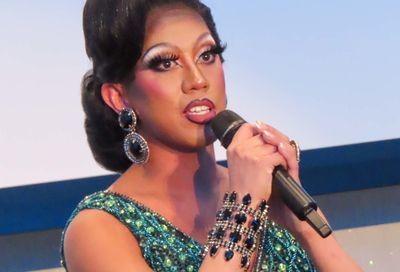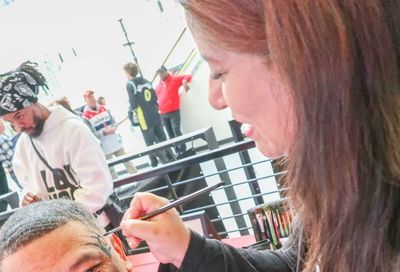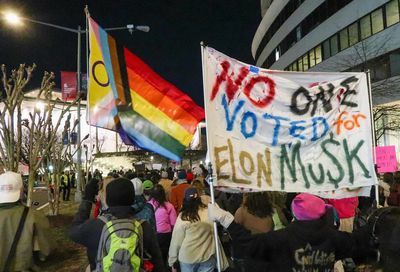The Prom’s Ariana DeBose and Jo Ellen Pellman celebrate being queer on-screen and off
Pellman and DeBose star as queer teens whose secret love sparks controversy and choruses in Netflix's The Prom

The Prom made history on Thanksgiving 2018, though not inside a Broadway theater. Instead, it was on actual Broadway during the Macy’s Thanksgiving Day Parade, as the show’s cast closed a performance of “It’s Time to Dance” with the first lesbian kiss ever broadcast during the holiday TV perennial. Caitlin Kinnunen and Isabella McCalla, who played adorable teen lesbians Emma and Alyssa in the Tony-nominated production, took one another’s hands, moved in close and kissed — not a blink—and-you-missed-it peck, but a deep, passionate smooch.
“It was really emotional because I knew that so many people who were watching that moment were with their families,” says Chad Beguelin, The Prom‘s lyricist and co-writer with Bob Martin. Beguelin “hoped that anybody that was worrying about coming out,” who witnessed the onscreen kiss, felt emboldened to start a conversation. “We were just so thrilled that the network and Macy’s said, ‘Absolutely, we are doing that song the way it’s done in the show,'” he says. “So I knew at least it would hopefully start conversations and give queer people a chance to see themselves on screen and represented.”
The Prom started with producer Jack Viertel, who conceived the musical tale of two Midwestern high school lesbians who just want to attend prom together. A grandstanding group of New York thespians, who read about the girls’ troubles, butt in to spin their plight into a cause célèbre and reap the windfall of publicity. Thus, a big-budget musical was born, inspired by too many cases of queer teens being banned from their proms.
Viertel enlisted director-choreographer Casey Nicholaw, who, in turn, reassembled the creative team from Broadway’s Elf: composer Matthew Sklar, lyricist Beguelin, and book writer Martin. “When Jack Viertel pitched the idea to us,” says Martin, “we were excited about this angle of showing a group of very narcissistic, ill-informed liberals from New York coming into a community that they didn’t understand and trying to impose their values on the community. It gave us a way of addressing both sides of the equation with respect to the issue at the heart of the show.”

The script and songs address both sides in a handful of different genres, from slinky, Kander and Ebb-style jazz to full-on, belting showtunes. “We had to really write two scores,” says Sklar of finding the right balance. “But it still felt like a part of one piece. You had your Broadway sound and each one of the characters has their own musical voice. And then, when we went to the town and dealt with the kids, it went into a bit more of a pop world.”
The score also reflects emotional facets that penetrated deeply for Beguelin, who always kept in mind the real-life Emmas and Alyssas, denied acceptance in their homes, schools, and communities. “As a gay man myself, it was very frustrating to keep seeing these stories crop up,” he says. “And so the idea of doing something that had a message about inclusion was exciting. But the idea to surround it in a comedy so that it wasn’t this after-school special, but actually made you laugh and then made you cry, was, I thought, a really great way to get our message across, through humor and music.”
The message certainly got across to the indefatigable film and TV titan Ryan Murphy. As Sklar sums it up, Murphy “came to see the show, fell in love with it and wanted to make it into a movie.” So here we are, two years since that fateful onscreen kiss, and The Prom, the motion picture directed by Ryan Murphy, has debuted on Netflix, featuring a starry lineup that includes Meryl Streep, Nicole Kidman, Kerry Washington, James Corden, Andrew Rannells, Keegan-Michael Key, and Tracey Ullman. “The whole thing has been this wonderful, surreal thing that kind of came out of thin air,” Sklar marvels.
In fact, the experience of shooting the film “was one enormous pinch-me moment,” says Martin. “I mean, it was an absolute thrill to watch Meryl Streep, who’s somebody I’ve admired my entire life. James Corden is someone who I knew from when I first entered the Broadway community. He was on Broadway doing History Boys. And he was just, to me, a kid who was in New York for the first time. So it’s amazing to have seen his career just grow, and he does a beautiful job with Barry. And Nicole Kidman, an actual live movie star. That was quite an amazing thing. [It] was such a beautiful experience to see the detail and the care with which Ryan brought the whole thing to life.”
At the center of Murphy’s film are The Prom‘s teen romantic leads, out-and-proud Emma and closeted Alyssa, played by newcomer Jo Ellen Pellman and Broadway vet Ariana DeBose, both of whom are openly queer. “They’re both wonderful singers,” Sklar raves. “And they’re both wonderful interpreters of songs.”
“Jo Ellen has — and I think this is because of the way Ryan interpreted our material — a real courage from the very beginning of the piece,” adds Martin. “She’s unashamed of who she is, really from the beginning. And there’s just a real strength of character that radiates from her as an actress. So when she is betrayed in the middle of the film by the town, you really, really feel the pain of the betrayal. She’s such an expressive actress. I think she’s a wonderful discovery.”
Both performers are “bringing their own personal life experience to these roles,” says Sklar. “So it was thrilling to watch them on set. They really had each other’s back and had such great chemistry. They just seemed to be having the time of their lives and it really shows on screen, I think.”
Sitting down for a tandem Zoom interview from their respective homes, Pellman and DeBose still seemed to be having a good time. Demonstrating their easy rapport, they shared what it meant to bring Emma and Alyssa’s lightning-rod of a romance to the screen.

METRO WEEKLY: The last double interview I did was with Kaitlyn Dever and Beanie Feldstein for Booksmart, another fun high school movie featuring teen lesbians. How cool is it that we’re seeing more movies like The Prom and Booksmart and Love, Simon, dealing with aspects of growing up queer?
JO ELLEN PELLMAN: I am so excited for this. What I keep thinking is how much a film like The Prom would have meant to me as a young kid, and I’m just so excited that now we have more and more media out there that celebrates the LGBTQ community. And I really do think a lot of this is thanks to champions like Ryan Murphy, who has been working for LGBTQ representation for decades. The reason that we can have a film like The Prom now is because of the work that has been done for decades by our queer elders.
ARIANA DEBOSE: It’s really exciting to realize that we’re in a moment where we’re getting the opportunity to normalize our coming-out stories and coming-of-age stories. I was with Kerry [Washington] and we were speaking to a reporter at The Advocate who identifies as lesbian. And she said — and it broke my little heart — that when she was growing up, she never once imagined that she would see a lesbian couple as the romantic leads of a film. And now we’re in an age where that is a reality. I’m so proud that we’re a part of this conversation. And personally, for me, as a woman of color, to be able to bring to life Alyssa’s story — and you do see her coming-out journey and it’s tough, but it does have a happy ending — that’s exciting because we don’t always get to talk about that in our Black and brown communities.
MW: On a personal note for each of you, did you attend your senior prom? If so, how was it?
PELLMAN: I attended my junior prom and I remember I wore this red off-the-shoulder dress that I had rented. I felt so cute. And I was actually on the prom planning committee, and so I was in the Alyssa Green role of being on the planning committee and I remember just dancing the night away with friends and it was fun, but it is nothing like the inclusive prom that Ryan Murphy threw for us.
DEBOSE: I went to my senior prom and it was fun. I wanted to dance with this girl I had a crush on, and my date was actually my best friend, who was a dude, and he knew I was questioning. He was like, “Yeah, go. Live your dreams.” So I did. I was jamming with her and I was having a good old time too, and then I realized people were staring and not in a positive way. So I cut a rug all the way back to the punchbowl. Then to have the opportunity of doing The Prom, where in the end, we do get this big inclusive celebration where these two girls get to dance with each other, being each other’s chosen person and being celebrated, that was so…chef’s kiss. It was great.
MW: For Emma and Alyssa just to be seen together is an act of courage. Particularly for Jo Ellen, was there any aspect of your own experience that you drew on to find the courage that defines Emma in this story?
PELLMAN: I am so fortunate that my coming-out experience was a really positive one. I came out when I was 17, the same age that Emma is in the film, and my mom is gay, so it was not a big deal. I just felt very welcomed and loved. And same with my friends — they were so supportive and accepting. But I think the word that really helped me tap into the character, and it really just sort of represents the character of Emma for me, is “optimism.” That’s something that Ryan Murphy really helped me find. Especially, I think about the song “Just Breathe,” and how in the face of all of this inequality and bullying that Emma faces, she still maintains a sense of determination. She knows that even though things aren’t great right now, they always have the possibility to be better. And that’s what I just hope young audiences especially can take away from this film, is that hope, that optimism, that there are people are out there — whether it’s chosen family or their family unit — who can’t wait to love them and support them, and to just keep that optimism and that hope alive.
MW: Ariana, in your high school life or adolescence, were you ever put in a position of having to stand on courage and defend your rights publicly in the way that these characters do?
DEBOSE: I’ve always been someone who just sort of lived out loud. I say what I mean, I mean what I say, sort of thing. I mean, I don’t really remember actually coming out, to be perfectly honest. I remember sitting in a car with my mother and I had just left a dance class and I said, “Hey, Mom, I think I could like boys and girls. I just really like humans. I think everybody’s pretty.” And she was like, “Okay, cool. Moving on.” And that was sort of that. I was probably too focused on trying to be excellent in high school to actually have a boyfriend, or a girlfriend, for that matter. But I would say as far as bravery and courage, when I moved to New York City, that was sort of when I really had to step into my own, on owning my sexuality in a different way.
New York City is a melting pot, and it is a beautiful haven for our queer community and our queer family and acceptance, but there are pockets of it that are not as accepting as you’d think. And I remember walking down the street, in Harlem, mind you, holding a woman’s hand, a woman that I loved, and that did not go well. Did not go well. I remember having to take a big old deep breath and decide whether I wanted to dignify their unwanted, and quite frankly inappropriate, rhetoric with a response. And I think I turned around and just said, “Bite me. Mind your own business,” because I couldn’t help it. I needed a little something. But I have made it my goal, or my mission, to try and lead by example. I stand in my truth unapologetically, and that’s sort of the way that I’ve chosen to go down that path.

MW: Both of you have come out publicly to identify as queer, which, for better or worse, is still a brave thing for a performer to do. Was there any trepidation in doing that on a professional level?
DEBOSE: No, I was pretty gung ho about the whole thing. I didn’t see any reason to not be who I was. And quite frankly, I just sort of lived my life in a way where I didn’t even think about the professional ramifications, if there were going to be any. I sort of make decisions, go for it and then see what happens. I acknowledge that there have been some interesting things that have come my way as a result. For example, when people do figure out you identify as queer, all of a sudden you get a lot of lesbian and LGBTQ material coming your way, asking you to audition, specifically in the film and TV world.
But for me, I hold the belief that you don’t necessarily need to specifically identify as that one thing. You need to be able to inhabit this character. That’s my own personal belief. So I didn’t want to feel like I was limited by how I live my personal life. I believe in separation of church and state, in a way, so that’s my standpoint on the whole thing.
PELLMAN: And I guess, for me, I feel like I’ve been out for a while now and it’s just a known fact that I celebrate about myself. And again, like what Ari said, separate church and state. It’s so personal, and there was never any question about whether or not it would be a part of the conversation because it just is.
MW: Sticking with that positive, affirming feeling — as opposed to the fear of rejection that both of the girls experience in this movie — what are some experiences of affirmation and inclusion that you’ve felt specifically for being queer?
PELLMAN: I guess just saying that I know that my upbringing is radical in and of itself [by] a gay single parent in the Midwest. And I realize that I’m so fortunate to have had that experience where queerness is the norm, and that we were having those conversations when I was little. So I just feel like my whole life has been an affirmation that this is something to normalize, to celebrate, to accept. I have my mom to thank for that.
DEBOSE: I don’t know if I necessarily have anything that’s totally different from that. I think I was raised in a way that I was taught to believe that you can be and do and accomplish anything that you set your mind to. There’s nothing wrong with you being who you are. And I really do believe that. And I also was raised by a community of very strong women. We’re all very opinionated. But we also believe that we share those opinions with light and love and we make space for those who disagree with us.
I think my life is a celebration of all of those things and, very much like Jo Ellen, I have an incredibly strong mother who has sort of shepherded that energy, that spirit, and that’s where it comes from. Literally, I had a moment last night where I was like, oh my gosh, I am my mother’s daughter. This is so awesome.
MW: That’s a great reaction to that realization. Not everybody would react so positively.
DEBOSE: Right. And I acknowledge that. And again I think Jo Ellen and I would say that we realize how lucky we are that we have parents who raised us in a specific way, who allowed us to be exactly who we are, who made space for us. Because that is not the norm. Not every young person who identifies as LGBTQ gets that opportunity. But I specifically hope we’re moving towards that day where our experiences are the norm.
“I remember walking down the street holding a woman’s hand, and that did not go well. I remember having to take a big old deep breath and decide whether I wanted to dignify their unwanted, inappropriate rhetoric with a response.” —Ariana DeBose
MW: Jo Ellen, you said you’re from the Midwest. Where specifically?
PELLMAN: I’m from Cincinnati, Ohio. And then I went to school at the University of Michigan, so I’m very much in the Midwest. And I’m actually back home in Cincinnati right now.

MW: I read that Ryan Murphy “handpicked” you for this part.
PELLMAN: Wow, even to just hear that spoken out loud, I mean, it’s still a dream come true. I do like to say that I have Ryan Murphy to thank, I think, for my love of performing and acting and music, because I was such a Glee fan in high school and in middle school, and it really did inspire me to want to pursue this as a career. So he has that hand in my career, and also this wonderful opportunity. I also have to shout out our amazing casting director, Alexa Fogel, who put my tape in front of Ryan to be seen, and she really championed me behind the scenes and really created the environment for Ryan to say yes. So I have both of them to thank for where I am right now.
MW: That’s awesome. Ariana, a different casting question, about landing Anita in Steven Spielberg’s West Side Story. How is that going?
DEBOSE: It went well. It’s done. It’s in the can. Last thing I heard is that it is finito, and Steven is very proud of it. While I haven’t seen it yet, I can’t wait to see it. Just from the experience of making it, it was an absolute thrill. It was a once in a lifetime. We made it on the streets of New York. I cannot wait to see all of the energy and the beautiful Latinx representation on the screen. I mean, I was working on West Side when The Prom happened for me. It was nuts. I thought about it recently. I was like, I wonder if The Prom would have happened for me had West Side not happened. I don’t know. But I’m very glad that it did. It was a snowball effect and I’ve learned so much.
Being a member of the Black and brown communities, there’s so much to talk about, and there’s so much nuance, and there’s so much understanding that I think we can even cultivate amongst ourselves that both of these films highlight. That excites me. Because I do believe art, and specifically film — and with a film like The Prom, on an international platform like Netflix — we can have these conversations on a scale that is absolutely insane. And that is what is so thrilling. We live in a time where our content can be received by 162 million subscribers, so we can talk about representation and we can talk about all of these LGBTQ issues. We can even get into the nitty gritty of what we can do in our homes to make our lives better and to make this a more just world. And I am so excited that Jo Ellen and I get to do this together, and I’m excited to have a seat at the table. This is great.
MW: Speaking of scale, I have to ask about the climactic scene. You’re playing this pivotal, emotional moment surrounded by Nicole Kidman and Meryl Streep and Tracey Ullman and Kerry Washington. Tell me about walking on set that day and performing that.
DEBOSE: It was nuts. At least for the journey of Alyssa Green, she has the emotional, not burden, but the emotional challenge of coming out. And again, when you’re making a film, you’re going to do something over and over and over and over again until they’ve gotten everyone’s coverage and your closeup, so it can be emotionally draining. But you also get this inclusive prom at the end, which is both joyful and emotionally heavy at times, and to do it with the support of all those names that you just listed, that was special.
There was a moment where I kind of lost it. There were a lot of different moving pieces that day, and I couldn’t quite get my emotions under control. And Tracey Ullman looked at me, she goes, “Darling, you need a cup of tea? You okay?” And I was like, [sobbing] “I’m going to be okay, Miss Tracey, thank you so much.” And she said, “I’m going to send Meryl over to talk to you.” And so Meryl came over and gave me a hug, and we got back on track. And Kerry was my consummate partner. So I was lucky to feel supported in those moments.
MW: Jo Ellen?
PELLMAN: Oh my gosh, echoing everything Ari said. Shout-out to Tracey Ullman!
DEBOSE: Tracey Ullman!
PELLMAN: Love her so much. My source of energy, my source of support that day was this undying energy that our background actors and our dancers were giving to us. It really did feel like we were constantly just feeling the love of all of these hundreds of people coming together for a common purpose, and that really made the moment so magical for me.
The Prom is exclusively streaming on Netflix. Visit www.netflix.com.
Read More:
Jonathan Bennett on bringing gay representation to Hallmark in ‘The Christmas House’
Soul review: Pixar’s latest is daring, masterful, and brilliantly simple
Support Metro Weekly’s Journalism
These are challenging times for news organizations. And yet it’s crucial we stay active and provide vital resources and information to both our local readers and the world. So won’t you please take a moment and consider supporting Metro Weekly with a membership? For as little as $5 a month, you can help ensure Metro Weekly magazine and MetroWeekly.com remain free, viable resources as we provide the best, most diverse, culturally-resonant LGBTQ coverage in both the D.C. region and around the world. Memberships come with exclusive perks and discounts, your own personal digital delivery of each week’s magazine (and an archive), access to our Member's Lounge when it launches this fall, and exclusive members-only items like Metro Weekly Membership Mugs and Tote Bags! Check out all our membership levels here and please join us today!























You must be logged in to post a comment.